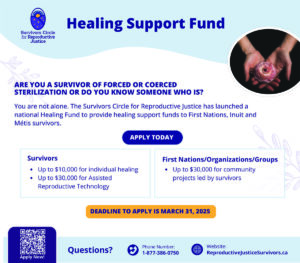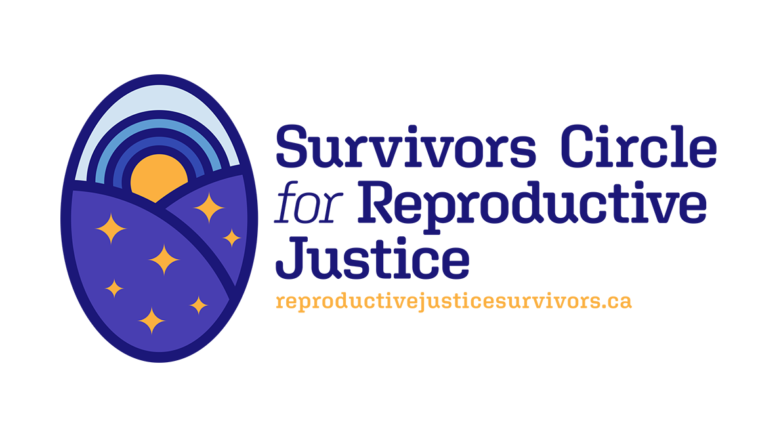By Kinnukana, Local Journalism Initiative Reporter
(ANNews) – The first annual national gathering of survivors of forced and coerced sterilization, Weaving Threads of Healing: Embracing our strength and honouring our voices, took place on the unceded traditional territory of Algonquin Anishinaabe Peoples in Gatineau, Quebec from March 7-9, 2025. The gathering brought together close to eight hundred First Nations, Inuit and Metis survivors to learn more about the work of the Survivors Circle, reproductive justice and addressing racism in the Canadian healthcare system. The conference also provided a platform for survivors to connect with each other and receive healing supports.
The forced or coerced sterilization of First Nations, Métis, and Inuit throughout Canada involves sterilization often without informed consent or under duress. The legacy of these practices continues to affect Indigenous communities today. The most recent sterilization took place in 2023. Many survivors were misled or coerced, sometimes while receiving medical care after childbirth. This practice deeply traumatized survivors, affecting their trust in medical institutions.
The Survivors Circle for Reproductive Justice (Circle), an Indigenous-led national not-for-profit organization in Canada, was officially registered on January 14, 2023, to advocate for reproductive justice for First Nations, Inuit, and Métis peoples. In 2024, it launched a national registry to document the experiences of Indigenous survivors of forced and coerced sterilization. To support survivors, the organization also introduced the Healing Support Fund for healing, assisted reproductive technologies, and community initiatives.
Harmony Redsky, Executive Director of the Survivors Circle for Reproductive Justice said, “What needs to be done now to stop this from recurring is absolutely more information getting out there to communities to remove the stigma that exists for women and men to feel safe to be able to talk about their reproductive justice, in a family setting, relationship setting, in a community setting and a health care setting. For decades and decades Indigenous women have been silent when it comes to topics such as reproductive justice and the issue of childbirth, sexuality and any of these topics that have not been discussed at family and community levels in the past.”
 At the gathering many survivors said that they never spoke to anybody about what happened to them, including their spouses. Some survivors said that this was the first time they were sharing their stories. Many survivors felt alone. They didn’t realize this was a common issue. Because their situation happened a while ago, many had put the issue behind them and accepted it. They did not know that there was any recourse for them. Many are told that if they are unhappy with the health services, they can complete a customer satisfaction survey or file a complaint, which is not the type of justice that they may be seeking.
At the gathering many survivors said that they never spoke to anybody about what happened to them, including their spouses. Some survivors said that this was the first time they were sharing their stories. Many survivors felt alone. They didn’t realize this was a common issue. Because their situation happened a while ago, many had put the issue behind them and accepted it. They did not know that there was any recourse for them. Many are told that if they are unhappy with the health services, they can complete a customer satisfaction survey or file a complaint, which is not the type of justice that they may be seeking.
Historically, forced or coerced sterilization was rooted in government policies aimed at assimilating or controlling Indigenous populations. Government, in partnership with medical and social institutions, sought to eliminate what was viewed as “undesirable” aspects of Indigenous culture and identity. This is part of a broader pattern of colonial policies, including the residential school system, which aimed to erase Indigenous languages, traditions, and ways of life. Forced or coerced sterilization is sometimes justified through eugenics, aiming to reduce the Indigenous population or “improve” society.
The Senate of Canada’s Standing Committee on Human Rights released two reports on forced and coerced sterilization in 2021 and 2022. The first report highlighted the ongoing nature of the practice, disproportionately affecting Indigenous, Black, and racialized women, persons with disabilities, and institutionalized individuals. The second report, The Scars that We Carry, reinforced these findings, calling for legal and policy reforms, criminalization of the practice, federal apologies, compensation for survivors, and improved healthcare oversight. Both reports stress the urgency of addressing this violation of reproductive rights in Canada.
Bill S-250, titled “An Act to amend the Criminal Code (sterilization procedures),” was introduced in the Senate of Canada on June 14, 2022, by Senator Yvonne Boyer. Bill S-250 seeks to amend the Criminal Code to criminalize forced or coerced sterilization, making it an indictable offence punishable by up to fourteen years in prison. The bill emphasizes the need for medical practitioners to obtain free, prior, and informed consent, aligning with international human rights standards. Having passed third reading in the Senate, Bill S-250 is now awaiting its first reading in the House of Commons as part of Canada’s broader effort to protect reproductive rights and bodily autonomy.
At the gathering, a key session focused on assistive reproductive technology. The Circle is involved in a research project with the University of Ottawa around developing a resource centre for assistive reproductive technology for First Nations, Inuit and Métis survivors who can access new services to help them, such as reversal surgeries as part of their reproductive justice. The Circle has a new funding stream that helps survivors to access new technologies. If a survivor wants to access these resources, there are different options for verifying their situations, including signing a statutory declaration, providing updated medical charts, etc.
During the National gathering a jingle dress was created by all of the survivors in attendance. Each survivor added a cone onto the jingle dress. At the closing ceremony, the jingle dress was danced for the first time and a healing dance was performed for the survivors. Now, the jingle dress will travel to communities and help to build awareness and provide the healing for all survivors impacted by forced or coerced sterilization.
For more information on the Survivors Circle for Reproductive Justice visit reproductivejusticesurvivors.ca



Be the first to comment on "Survivors of forced and coerced sterilization gather to start the journey of greater understanding"